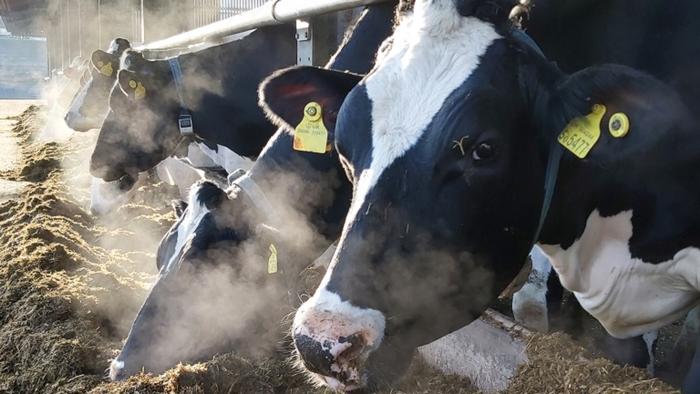Harper Adams University Study Shows Collaboration and Continued Support Key to Enhancing Dairy Herd Health
Research into an animal health programme for Welsh dairy herds has shown how collaboration and ongoing support helped farmers get the best from their cattle.
The preventative HerdAdvance programme was run by AHDB for the Welsh Governmen and has worked with 500 dairy farmers across Wales over three years.
During and after, the project was assessed by a team of researchers, led by Harper Adams Elizabeth Creak Chair Professor David Rose. The team have just published a paper in The Journal of Agricultural Education and Extension exploring their findings.
Working with the farmers – who, between them, managed around a third of the entire Welsh dairy herd – HerdAdvance tried to improve preventive animal health planning, working on areas such as mastitis, lameness and Johne’s– as well as looking at genetics and genomic improvement, housing, and youngstock management.
Professor Rose explained: “The aim of the project was to try and help farmers manage their animal health better – so instead of diseases occurring, and the farmer having to phone the vet and treat them, it tried to come up with an action plan to prevent those problems happening in the first place.
“Our paper is about the package of support that AHDB offered. We then explored the support the farmers received, which helped them implement those new animal health measures”
Each participating farmer in HerdAdvance was visited by an AHDB regional extension officer, who collected baseline data on their herd’s health performance across all of the areas covered in the project.
At the start of the first and final years of the project, the officer visited with the farmer’s own vet and reviewed herd health and biosecurity plans.
Working with both their vet and the officer, each farmer could pick up to three priority disease areas over the course of the project. Between them, the farmer, officer and vet would draw up an action plan, which had to be implemented, with the officer working to keep collecting health data and helping the farmer to stay on track with their plan.
Participating farmers also received various kinds of free assistance during the project, including:
- The data collection and extension service from AHDB officers throughout the three years – both in-person and on the phone
- Two vet visits
- Support from a livestock housing expertif applicable
- Testing for certain diseases
- Farmer peer-to-peer focus groups, sharing experiences with others involved in HerdAdvance(disrupted due to COVID)
- Tools to help implement action plans – such as mobility scoring charts for assessing lameness
Professor Rose added: “We found out you need a combination of different types of support to help farmers do new things – it wasn’t sufficient just to provide some economic incentives, or just to provide some free visits from the vet and free testing for disease – farmers also had to understand how to do these new behaviours, for example.
“Likewise, it wasn’t sufficient for them to understand how to do something – they had to see that there was a benefit in them doing a new behaviour, that it improved the performance of their farm, and that it reduced disease.
“It was really a lesson that it was, firstly, a combination of different types of support, and secondly that all of the people providing that support worked well together – the farmers, the vets, the AHDB extension officers, the companies providing the disease testing.
“All of these different people had to communicate and be there to support the farmers every day on this journey, not just to turn up to a meeting and say, ‘we’ve agreed this’ – but to be there all the way through.”
Turning to the suggested policy recommendations the research team are making after looking at the HerdAdvance programme’s impact, Professor Rose stressed to those looking to help farmers change that they should avoid offering a single ‘headline’ piece of support.
He added: “One of the things, for example, that DEFRA are doing in England with the Animal Health and Welfare Review – though this has been recently updated to include other measures – is to provide free vet visits for farmers.
“In and of itself, that’s very useful – but the quality of that vet visit was enhanced in the HerdAdvance project by having an extension officer you could phone up at any time, to say ‘well I agreed with the vet, but I forgot how to do it, or forgot what we agreed, can I have a bit of extra support?’
“The other thing is – as support is always finite, with any project you can’t give farmers financial incentives indefinitely – to ask: have you embedded the knowledge and understanding of how to do something and the positive difference it makes, so that farmers feel they should be doing that, even in the absence of you incentivising it?
“For HerdAdvance, there was very detailed data collection on how farmers were doing in terms of animal diseases every year – so they could see: ‘I’ve improved, I have got better – so this is the right thing to do!’”

